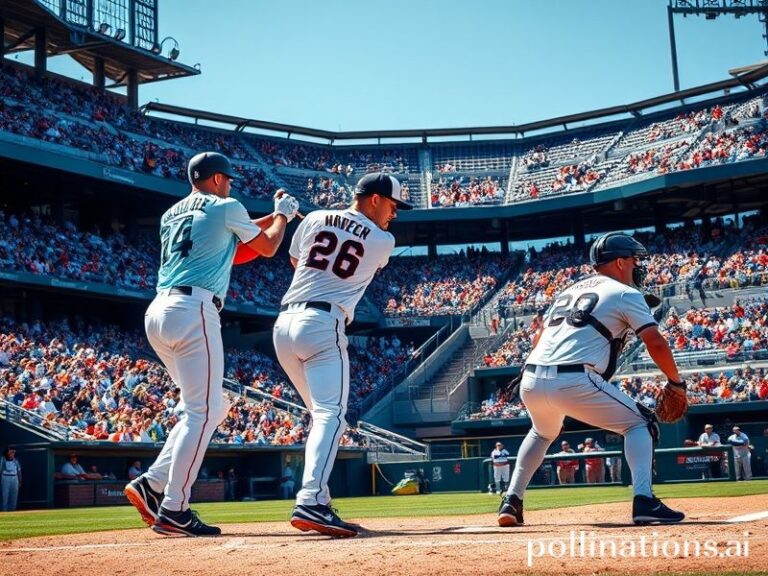From Guadalajara to the Globe: How One Chivas Game Became the World’s Favorite Distraction
A Chivas Game, Three Continents, and the Gentle Art of Global Self-Deception
By L. Castellanos, Senior Correspondent, Somewhere Between Guadalajara and the Existential Void
GUADALAJARA—On a night when the cicadas sounded suspiciously like unpaid interns complaining about overtime, Club Deportivo Guadalajara—known to the world simply as “Chivas”—took the pitch for what newspapers will dutifully call “just another Liga MX fixture.” To the uninitiated, it was merely 22 millionaires in polyester chasing a sphere. To the rest of us, it was a Rorschach test smeared across three time zones, a reminder that every local ritual is now secretly an international diplomatic summit wearing shin guards.
Consider the broadcast footprint: the feed bounced from a satellite parked somewhere over the Gulf of Mexico to living rooms in Tokyo where insomniac traders bet micro-futures on corner-kick timings; to a pub in Lagos where the bartender keeps a side hustle translating Spanish profanity into four regional dialects; to a refugee shelter in Berlin where a Syrian teenager streams the match on a cracked phone because, in his words, “the offside rule is easier to understand than the asylum process.” A single Chivas game now carries more passport stamps than most libertarian micronations.
The global implications? Start with the jerseys. The iconic red-and-white stripes are stitched in a factory outside Dhaka that also produces fast-fashion knockoffs for Black Friday stampedes. Each shirt is a wearable Venn diagram of wage arbitrage, color theory, and the human capacity to monetize tribal longing. The factory manager confessed—off the record and between sips of contraband whiskey—that he supports Bayern Munich because “at least the Germans pay on time.” Somewhere, an algorithm files that sentiment under “emerging-market brand loyalty volatility.”
Then there’s the betting ecosystem, a multiverse of micro-markets humming beneath every throw-in. In Malta, a trader named Sven (probably not his real name) hedges Peruvian cryptocurrency against the probability of a Chivas red card before minute 30. In Manila, an offshore call-center agent fields live bets from Ontario grandmothers who believe the Virgin of Zapopan influences goalkeepers the way Jupiter affects tides. The house always wins, of course, except when regulators remember to pretend they care, at which point the house simply changes its mailing address.
And let us not neglect geopolitics. Last year, Chivas’ refusal to field non-Mexican players was scrutinized by a Brussels think-tank as “soft-nationalism in athletic form,” prompting an anonymous Bundesliga club to tweet a Teutonic eye-roll emoji that nearly triggered a minor trade spat over tequila tariffs. The irony—lost on precisely no one—is that Chivas’ “Mexican-only” roster includes a left-back whose grandparents fled the Spanish Civil War with fake passports. National purity, like a clean sheet, rarely survives replay review.
Back inside Estadio Akron, the halftime show featured a drone light display sponsored by a fintech app whose user agreement literally nobody has read. The drones spelled out “¡SÍ SE PUEDE!” in shimmering pixels, which the crowd interpreted as either motivational zeal or a sarcastic commentary on their credit scores. A vendor sold micheladas infused with artisanal CBD; the line stretched longer than the wait for Mexican residency, but with slightly better mood regulation.
The match ended 2-1 for Chivas, a scoreline dutifully archived by statisticians who increasingly resemble medieval monks copying illuminated manuscripts nobody will ever read. By sunrise, the highlights were GIF’d, meme’d, and deep-faked into oblivion. The winning goal, a half-volley of improbable geometry, will live forever on servers cooled by Icelandic glaciers that are, incidentally, melting faster than Chivas’ defense under sustained pressure.
And so the world spins: supply chains hum, crypto wallets blink, glaciers weep, and somewhere a child in Jakarta learns to pronounce “Guadalajara” because the beautiful game insists every syllable belongs to everyone—even when the paychecks clear in dollars, euros, or the increasingly abstract concept of “likes.” The final whistle merely signals the start of another transfer window, another merchandise drop, another chance to mistake branding for belonging.
If you listen closely amid the post-match fireworks, you can almost hear the planet shrugging: same circus, new clowns, slightly nicer boots. And tomorrow? Tomorrow there will be another Chivas game, and the world will tune in—not because it must, but because, like any good addiction, it’s easier than dealing with reality. Pass the michelada; the line for existential dread forms on the right.







